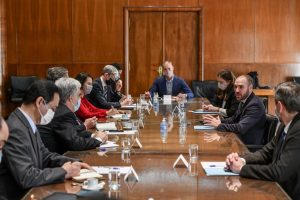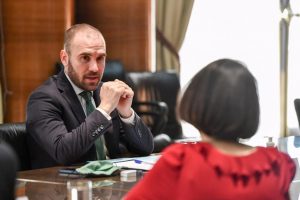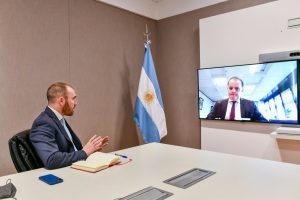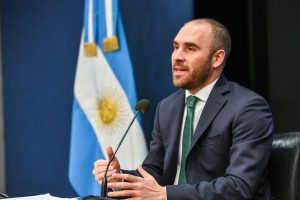The pandemic has deepened inequalities and asymmetries among advanced countries and the rest, and today, taxing multinational corporations is a must
Some contents are only available in Spanish. For more information, please contact us at: ciudadano@mecon.gob.ar / (+54-11) 4349-5000
The Minister of Economy, Martín Guzmán, held a meeting on Tuesday at the Palacio de Hacienda with ambassadors and commercial representatives from 10 countries, where he discussed matters of bilateral interest in view of the next G20 meetings in Italy, to be held on July 9 and 10.
At the meeting, Mr. Guzmán also spoke with the ambassadors and commercial representatives about the understanding reached by Argentina and the creditor countries of the Paris Club, which consists of a “time bridge” until March 2022 that averts a default and implies a financial relief for the country of USD 2,000 million.
Likewise, Mr. Guzmán confirmed Argentina’s intention to continue working constructively with the representatives of the International Monetary Fund (IMF) and anticipated that he will travel with his team to the G20 meeting that will take place next July.
The Ambassadors attending the meeting were Ulrich Sante (Germany), John Gartke (Canada), Javier Sandomingo Nuñez (Spain), Michelle Riebeling and Leah Severino (United States), Claudia Scherer-Effosse (France), Takahiro Nakamae (Japan), Mirta Gentile (Italy), Bernd Scholtz (The Netherlands), Elizabeth Green (UK), and Heinrich Schellenberg (Switzerland).
Mr. Minister was accompanied by the Secretary of Finance, Mariano Sardi, and the Head of the International Affairs Unit of the Ministry of Economy, Maia Colodenco.


This morning, Mr. Minister held a Zoom meeting with the president of the Paris Club, Emmanuel Moulin, where they discussed the details of the understanding. Later, during a press conference he stated that the understanding we have reached "allows us to avert a default situation on July 31 of this year."
The Minister of Economy, Martín Guzmán, announced last Tuesday that Argentina has achieved a “time bridge” until March 2022, as part of the negotiations that are being sustained with the member countries of the Paris Club. The understanding averts default and implies an economic relief for Argentina of 2,000 million dollars.
“The understanding is that Argentina will have until March 31, 2022 to seek a more permanent restructuring with the Paris Club, and that Argentina will continue to make efforts to reach an understanding with the IMF that will allow the country to refinance the 45,000 million dollar debt burden that Juntos por el Cambio (“Together for Change”) administration took between 2018 and 2019, whose funds were not used to increase the productive capacity of the economy in any way, but rather to pay unsustainable debt incurred with private creditors, which was restructured by our administration, and also to finance the capital outflow from Argentina,” Guzmán explained at a conference held at the Palacio de Hacienda.
This way, Mr. Minister stressed that the understanding “allows us to avert a situation of default on July 31 of this year”, and he emphasized that “solving the issue of unsustainable debt is a fundamental pillar in the process of calming the economy”. Likewise, Guzmán stated that the international negotiations that the country is conducting seek to “enable Argentina to sustain economic recovery and to target the creation of jobs, the reduction of inflation and poverty and the growth of economic activity”.
Along these lines, the Minister said that the agreement reached with the Paris Club, “implies a financial relief for Argentina of 2,000 million dollars between now and March 31”. In this sense, Guzmán pointed out that “the principle of comparable treatment between official bilateral creditors will be observed” and that “in an eight-month period, instead of facing the scheduled payment amounting to approximately 2,400 million dollars, we will make a set of payments that will add up to around 430 million dollars”.
Within the framework of said progress in the negotiations, this morning, Mr. Guzmán held a Zoom meeting with the President of the Paris Club, Emmanuel Moulin. After this dialogue, Argentina undertook to continue negotiating with said group of creditors and agreed that default will be averted by postponing the 2,450 million-dollar payment.
During his presentation, the Minister reassured his commitment to continue negotiating with the IMF in a constructive manner and stated that “this time horizon gives us greater certainty.” “The date March 31, 2022 is not in any way connected to the goal of an agreement with the IMF; our goal is to achieve a good agreement, the sooner the better, but the priority is for it to be good”, clarified Guzmán.
Mr. Guzmán also praised the work done by President Alberto Fernández; Vice President Cristina Fernández de Kirchner, the president of the Chamber of Deputies, Sergio Massa, and the head of the Frente de Todos (“Everybody´s Front) coalition, Máximo Kirchner, to calm the economy. “We will continue to take steps to calm the economy under the leadership of those who head our front, that is, President Alberto Fernández and Vice President Cristina Fernández de Kirchner; hand in hand with Congress, as we have been doing throughout the entire debt restructuring process with private creditors, “he said.
Finally, he pointed out: “We will continue to make efforts to solve all the problems that had been left to the Argentine economy both on the financial front and on the real front in order to have a country with an economic structure that is able to create more work, to add more value to the economy every day and to build a stable and calm environment for the people, homes, and businesses. Also this must be done in a federal way so that development abilities are distributed throughout all regions”.

